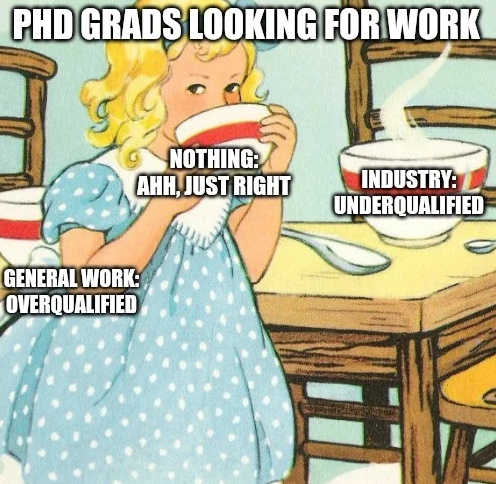this post was submitted on 03 Sep 2024
561 points (98.8% liked)
Science Memes
11081 readers
4056 users here now
Welcome to c/science_memes @ Mander.xyz!
A place for majestic STEMLORD peacocking, as well as memes about the realities of working in a lab.

Rules
- Don't throw mud. Behave like an intellectual and remember the human.
- Keep it rooted (on topic).
- No spam.
- Infographics welcome, get schooled.
This is a science community. We use the Dawkins definition of meme.
Research Committee
Other Mander Communities
Science and Research
Biology and Life Sciences
- !abiogenesis@mander.xyz
- !animal-behavior@mander.xyz
- !anthropology@mander.xyz
- !arachnology@mander.xyz
- !balconygardening@slrpnk.net
- !biodiversity@mander.xyz
- !biology@mander.xyz
- !biophysics@mander.xyz
- !botany@mander.xyz
- !ecology@mander.xyz
- !entomology@mander.xyz
- !fermentation@mander.xyz
- !herpetology@mander.xyz
- !houseplants@mander.xyz
- !medicine@mander.xyz
- !microscopy@mander.xyz
- !mycology@mander.xyz
- !nudibranchs@mander.xyz
- !nutrition@mander.xyz
- !palaeoecology@mander.xyz
- !palaeontology@mander.xyz
- !photosynthesis@mander.xyz
- !plantid@mander.xyz
- !plants@mander.xyz
- !reptiles and amphibians@mander.xyz
Physical Sciences
- !astronomy@mander.xyz
- !chemistry@mander.xyz
- !earthscience@mander.xyz
- !geography@mander.xyz
- !geospatial@mander.xyz
- !nuclear@mander.xyz
- !physics@mander.xyz
- !quantum-computing@mander.xyz
- !spectroscopy@mander.xyz
Humanities and Social Sciences
Practical and Applied Sciences
- !exercise-and sports-science@mander.xyz
- !gardening@mander.xyz
- !self sufficiency@mander.xyz
- !soilscience@slrpnk.net
- !terrariums@mander.xyz
- !timelapse@mander.xyz
Memes
Miscellaneous
founded 2 years ago
MODERATORS
you are viewing a single comment's thread
view the rest of the comments
view the rest of the comments

Interesting observations. Intent here is not to offer disagreements but just comparisons to my experience:
Yes, industry pays much better. The wage gap in academia is a huge deal and one which will not get attention until the general issue with low wages in the US is handled. That said, I make about twice as much in industry as I would have as a tenured professor in my field had I started at the same time.
This resonates with me in that I have heard it a lot. I think every person is different, but academia has a habit of supporting a kind of pretentiousness that is not conducive to pragmatic work. I would suggest this is highly field dependent, though.
Industry experience trumps academic, 100% of the time.
I came at it from a different path than you. I wanted to be a professor, through and through. The tenured professorship is generally unattainable, since the number of positions is nothing compared to minted PhDs. For that reason, I explored switching to industry. I ended up in a good space, but I am not at all suggesting that someone should get a PhD to go into industry.
Edit: there's also an epistemological argument to be made about #2 (the readiness of academics for industry). A lot of industry is about very specific solutioning and methods which may even be company dependent. In that sense, it is a skill you can only get from industry.
First paragraph had me laughing. Somebody has spent a lot of time in private industry and has gotten burned a few times.
As for #2 it depends on the age of the industry. Here is the life cycle of research driven industries as I see it.
Historically in research driven industries the foundations have been started in academia. Private companies start up relying on the universities research.
Money flows into the university systems from private companies and they start producing a lot PhD's in the field.
Next the private companies decide they can make more money doing the research in-house. They offer large sums of money to the established professors and get fresh grads at bargain prices.
Pretty soon most of the best and brightest are drained to private industry. The funding from private industry slows to a trickle and all that is left in academia is those with more social connections than ability.
For the next 30 years, private industry has great talent. Then the first first wave of PhD's retire. The new PhD's grads are trained by the social connections crowd.
That's when you start to see fun job descriptions posted like:
Without regard for anything else you said, do you think your experience is more representative than mine?
No - you missed my direction.
The paragraph is an overly polite way of writing to avoid any semblance of disparaging the other person. As mine was clearly written as a personal anecdote there is no need to qualify your remarks as non-derogatory.
Generally I see people develop those types of phrasing habits when they have negative experiences with misunderstanding in the past. Very common with many PhD's communicating with MBA's, sales or production teams. A little overly verbose but carefullly respectful to avoid conflict. It's a very good habit to have professionally but quite funny when out of context.
Which?
I think he meant ‘first’ as in top-most, the one with the preemptive disclaimer.